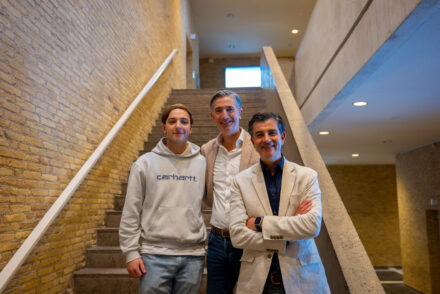Students from Spain on the Catalonia crisis
The battle over Catalonia’s status has laid bare a deeply divided Spain. What do Catalans and Spaniards studying at Tilburg University think about the Catalan push for independence?
In a controversial referendum, Catalonia voted on independence from Spain on 1 October. The referendum was declared illegal by the Spanish government, but around 42% of Catalans took to the polling stations anyway – with a staggering 90% of them opting for independence. The battle over the status of Catalonia has now driven the country towards its worst political crisis in decades.
“Declaring independence would only hurt Catalonia and the rest of Spain”
While tension between the Madrid and Barcelona governments continues to rise, Catalan leader Carles Puigdemont has threatened to declare independence. Tilburg University student Daniel Gonzálves from Catalonia hopes it will not come that far. “My personal analysis is that a declaration of independence, at this precise moment, would only hurt Catalonia and the rest of Spain”, he says. “It would only worsen the relationship and cause further instability.”
Referendum
Student Oriol Gil, also from Catalonia, does support independence. “The results from Catalonia’s independence referendum have shown that 90% of voters want to be independent from Spain”, he explains. “Even though the referendum was supposedly ‘illegal’, that percentage should mean something to the Spanish government. Instead, they refused to enter into dialogue, they looked away without caring, and as always, the information in news was manipulated.”
Pablo Ruiz is from a different part of Spain, which has its own history of violent struggle over independence: Basque Country. “I’m against Catalan independence”, Pablo says. Until six years ago, he explains, Basque Country struggled with the armed separatist group ETA. The years of ETA terrorism have shaped Pablo’s opinion of separatist movements. “I feel Spanish, I’m very proud of being Spanish, and I want Cataluña to be part of Spain. I’ve always believed that it’s much better to build bridges than to destroy them”, he says. In addition, Pablo believes the Catalan independence referendum was little more than a farce of democracy: “People could vote without their ID, they could vote five times, there were kids voting. It was pure theater.”
“The referendum was a farce”
Riot police
A reckless sham or not, Pablo also thinks the Spanish government responded badly to the situation. On the day of the referendum, almost 900 voters were injured in clashes with riot police. The police should not have tried to stop the banned referendum from going ahead by using force, Pablo says. “I disagree with the way the Spanish government handled it.”
“I was scared when so many people were injured by what was supposed to be our ‘police forces’”, Oriol says. He felt worried about his loved-ones in Catalonia. “Worried and helpless, knowing that my family, friends and all the people I know from Barcelona – even those whose voted against independence – could be violently repressed by the police when their only intention was to be democratic, and to vote for the future.”
Like Oriol, student Júlia Ramió Fusellas is from Catalonia and pro-independence. She was horrified by the police operation on the day of the referendum. “Thirty thousand Spanish policemen were sent to Catalonia on the 1st of October to disable the referendum”, she says. “In spite of the violence, more than two million Catalans cast their vote. Hundreds of voters were injured, some of them gravely. One man lost his eye after police shot him with a rubber bullet, which has been prohibited in Catalonia since 2014. I honestly can’t understand why such violence and repression can occur in a democratic country like Spain.”
“I know the truth, because my family was there, all my friends were there”
According to Júlia, many Spanish news reports on what took place in Catalonia on that 1st of October are misleading. “I feel really powerless, because the Spanish people don’t have real information about it. The media have been manipulated, and people believe that Spanish television speaks the truth. But they are just saying what the Spanish government wants people to believe. But I know the truth, because my family was there, all my friends were there!
According to Daniel, the Catalan government also carries some responsibility for the violent clashes between voters and police. “Catalonia’s premier said to go to vote that day. You, as individual of good faith, you may go to vote and follow the instruction of the head of Catalonia. You may not think that the referendum is illegal, when in fact it is. Puigdemont actually forced a police intervention against his own people”, he says. “However, the Spanish government should have remained still and not send police, since the referendum was far from anything legit and civilians should not be harmed.”
Economic disaster?
Arantxa Machicado from Madrid considers the referendum to be illegal. Because it wasn’t constitutional, Arantxa says, its outcome should not be accepted and Catalonia should not be declared an independent country. “In my opinion, Cataluña should stop the process of separation from Spain as soon as possible. Nobody is better off”, she says. “Since the day of the referendum, more than 700 companies have moved their headquarters out of Cataluña due to financial uncertainty. The further the Catalan government pushes this, the worse it’s going to get. They risk losing investors, both local and foreign. And tourism will suffer, while the tourist branch brings in a big part of Cataluña’s earnings.”
Pablo agrees that the economic consequences for Catalonia will be catastrophic. “Of course I’m worried about the situation, but I think that nothing is going to happen. In the end, Cataluña will continue to be part of Spain. Economically, independence would be a disaster for them.”
“Catalans feel stolen”
Júlia doesn’t believe that. In fact, she says that economic reasons are a major factor in Catalonia’s wish to be independent from Spain. “As in other countries, northern Spain is richer than the south. But Catalonia has always stood out and has been the engine of Spain. Catalonia is the autonomous community that contributes more to the Spanish state, with up to 22% of the national GDP. But Catalonia is not compensated at all. Catalonia puts in 16 billion euros per year, but nothing comes back from Spain. Catalans feel stolen.”
What now?
So what’s next for Spain and Catalonia? Daniel doesn’t think things will calm down in his region of origin anytime soon. “I don’t think it’s going to stop here. Many people want to decide themselves about the fit of Catalonia in Spain”, he says. “Only a great and legal reform on the territorial organization system would make things quiet down and help achieve a good understanding between Cataluña and Spain.”
“Since the referendum, demonstrations and protests are taking place almost every day in Catalonia”, Oriol says. “I personally think that the Spanish government is handling it quite wrong, and that if we continue on this path, things will get pretty worse soon.” Oriol thinks a new referendum could offer a solution, as long as it is recognized by both the Catalan and the Spanish governments, and if both governments accept the outcome. “If the yes-camp wins, Catalonia becomes independent from Spain. If the no-camp wins, we stay in Spain. Right now, the main problem is not whether we remain in Spain or not, it’s Spain’s repression of Catalonia. It doesn’t seem like we have a democracy if we cannot make decisions, if we cannot express ourselves, if we cannot vote.”
“The main problem is Spain’s repression of Catalonia”
‘The system would fall apart’
According to Gonzalo Barnuevo, who is currently still in Madrid and will start studying at Tilburg University this spring, the explosive situation is affecting Spain as a whole. “Economically, socially and politically”, he says. “I think it’s necessary to distinguish between wanting the independence to happen, and whether it could happen. Regarding whether it could happen, my answer is no. The Spanish Constitution was voted by the Spanish people through Congress, and that is why the Constitution stands above any other law approved by through Congress of through Regional Congress. The Constitution states that any referendum should be voted by the whole country and not unilaterally, like Cataluña has done. So if any party could disobey the most important existing law, what is left? The executive, judicial and legislative powers would fall apart. And in the case that Cataluña effectively gained its independence, would that mean that any village could gain independence? Again, if that happens, what is left?”
According to Gonzalo, the Catalonia crisis comes down to some fundamental questions: “What justifies a unilateral declaration of independence? Economic oppression? Social oppression? Where do we draw a line between the right to unity and the right to independence?”
Showdown
While the Catalan government has made very clear that it will continue to fight for independence, the Spanish government has made very clear that it will continue to fight for unity. The stage seems set for a political showdown, of which the outcome is all but certain.







